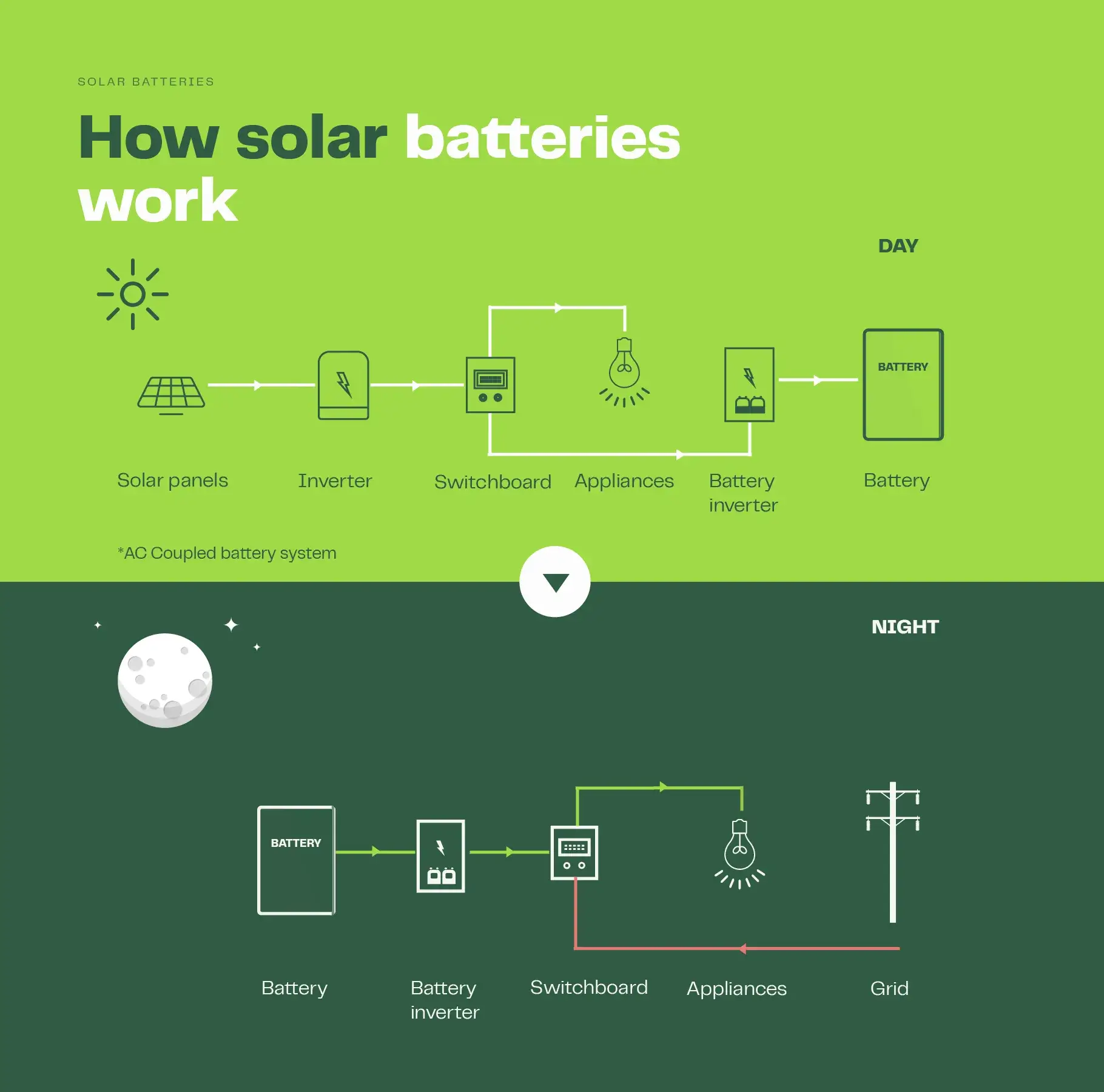How do solar batteries work?
Learn how solar batteries work in your home.
Solar batteries work by storing your excess solar power that would otherwise be sent back to the grid. When you need to use electricity at night, you can draw it from the solar energy stored in your battery.
Solar battery diagram

A typical system without a battery
Solar panels work by turning sunlight into electricity during daylight hours. If you are using appliances during the day, they will be powered by the energy produced from your solar panels. Typically, there will be excess solar power that cannot be used in your home, this gets sent back to the grid where you earn a solar feed-in tariff.
Solar batteries work at night
Adding battery storage to your system, allows you to store the excess solar energy for later use, instead of sending it back to the grid. At night, or when your solar panels are not producing power, you can use the solar power stored in your battery to provide the electricity you need for your home appliances.
How batteries work step-by-step
We explain step-by-step how sunlight can be turned into electricity and stored in a battery for use at any time.
During daylight hours
- Solar cells harvest the suns energy and convert it into DC electricity
- An inverter converts the current from DC to AC
- If electrical appliances are being used, a switchboard directs electricity to power them
- Excess solar energy is sent from the inverter to the battery inverter so that it can be stored in a battery
Stored solar energy is used at night
- When called upon, the battery sends energy through to the battery inverter
- The battery inverter converts it from DC to AC for use in the home
- The switchboard directs the stored solar energy to power your electrical appliances
- If the battery fully discharges, you buy electricity from the grid
Battery size, life cycles and discharge rates
A solar battery can only be charged and discharged so many times, this process is called a cycle. The best solar batteries can handle upwards of 4,000 cycles and normally come with a 10-year warranty, though their lifespan may be shorter if cycled often.
Depth of discharge
Solar batteries don’t discharge to their full capacity. Lithium-ion batteries typically discharge to around 90 – 95% of their capacity. If a battery is regularly discharged beyond the depth of discharge, it will shorten its life.
Battery capacity
The battery size is measured in kWh units. A 10 kWh battery’s useful capacity may really only be 9.5 kWh, if it has a depth of discharge of 95%.
Functionality
Some battery storage systems come with added functionality like power backup and the ability to sell to the grid during peak demand. A solar system with battery backup can power your home in the event of a blackout.
Not all systems have this added functionality, for some, it is built in, others it can be added, while for some it is not possible at all. Increased functionality will add to the overall solar battery storage price.
AC and DC batteries
The configuration of your solar panel and battery system may differ depending on the type of battery you buy. An AC battery can be retrofitted to any system. Many DC batteries can be fitted to systems too, but bear in mind that the type of battery can impact on functionality and not every battery may be able to be retrofitted to your existing system.
How solar batteries work to deliver savings
When a solar power system sends excess electricity back to the grid, you receive a feed-in tariff, normally around 8 – 13c per kWh. The exact amount depends on the state in which you live and the plan you are on with your electricity retailer.
Without a solar battery, you have to buy electricity from the grid at night. Depending on your plan and provider, you may be paying up around 30c per kWh to buy this electricity.
Battery savings
If you have a solar battery, you forgo the feed-in tariff (let’s assume 10c), but save by not having to pay the 30c per kWh to buy electricity from the grid.
The battery savings in this instance, work out to be 20c per kWh.
Battery rebates
Unlike the solar panel rebate, battery rebates are normally short-term incentive schemes run by state and territory governments. When available though, they do improve savings and payback periods.

Are you ready for the benefits of solar?
Get 3 free quotes and start your journey towards making the switch.
Get free quotes